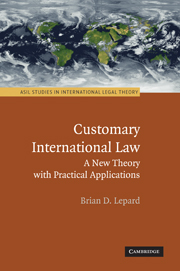Book contents
- Frontmatter
- Contents
- Figures
- Acknowledgments
- Cases
- PART ONE THE ENIGMAS OF CUSTOMARY INTERNATIONAL LAW
- PART TWO FOUNDATIONS OF A NEW THEORY OF CUSTOMARY INTERNATIONAL LAW
- 4 Clarifying the Concept of Authoritative International Legal Norms
- 5 Fundamental Ethical Principles and Customary International Law
- PART THREE RESOLVING THE CONCEPTUAL ENIGMAS OF CUSTOMARY INTERNATIONAL LAW
- PART FOUR RESOLVING THE PRACTICAL ENIGMAS OF CUSTOMARY INTERNATIONAL LAW
- PART FIVE SOME APPLICATIONS OF THE THEORY
- PART SIX THE FUTURE OF CUSTOMARY INTERNATIONAL LAW
- Bibliography
- Index
4 - Clarifying the Concept of Authoritative International Legal Norms
Published online by Cambridge University Press: 05 June 2012
- Frontmatter
- Contents
- Figures
- Acknowledgments
- Cases
- PART ONE THE ENIGMAS OF CUSTOMARY INTERNATIONAL LAW
- PART TWO FOUNDATIONS OF A NEW THEORY OF CUSTOMARY INTERNATIONAL LAW
- 4 Clarifying the Concept of Authoritative International Legal Norms
- 5 Fundamental Ethical Principles and Customary International Law
- PART THREE RESOLVING THE CONCEPTUAL ENIGMAS OF CUSTOMARY INTERNATIONAL LAW
- PART FOUR RESOLVING THE PRACTICAL ENIGMAS OF CUSTOMARY INTERNATIONAL LAW
- PART FIVE SOME APPLICATIONS OF THE THEORY
- PART SIX THE FUTURE OF CUSTOMARY INTERNATIONAL LAW
- Bibliography
- Index
Summary
A MODEL OF AUTHORITY
In this chapter I develop a conceptual model of the authority of international legal norms, including customary international law. I draw on philosophical and political literature on the subject, including insights from game theory.
To understand the nature of customary law, it is helpful to clarify the concept of authority in general and of authoritative international legal norms in particular. The philosophical literature exploring the nature of “authority” is immense, and there is much controversy in it. Nevertheless, almost all philosophers and legal theorists who have studied the notion of authority agree that it conveys a relationship in which an actor (such as a state) acts in accordance with a directive or norm out of a sense of obligation. To act out of a sense of obligation means that an actor allows its decision-making process, or some part of it – that is, its own “independent judgment” – to be preempted by an authoritative norm. In this sense, it can be said to “obey” the norm.
One way of understanding the concept of authority is through a model of decision making elaborated by legal philosopher Joseph Raz. Raz posits that actors normally make decisions to act in accordance with the “balance” of “first-order reasons” for and against an action. Raz implicitly defines “first-order reasons” as including reasons “on the merits” for or against the action. They also can include threats or requests. (See Figure 4.1.)
- Type
- Chapter
- Information
- Customary International LawA New Theory with Practical Applications, pp. 47 - 76Publisher: Cambridge University PressPrint publication year: 2010



